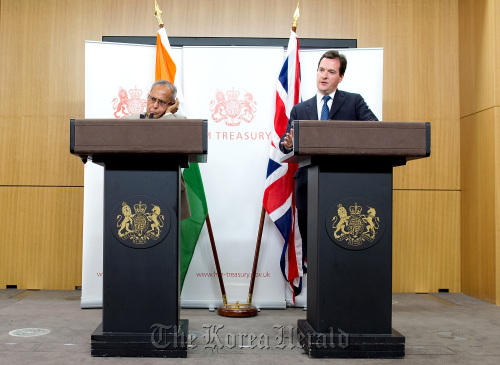 |
George Osborne (right), U.K. chancellor of the exchequer, speaks as Pranab Mukherjee, India’s finance minister, listens during their joint news conference at the Foreign and Commonwealth Office in London last year. (Bloomberg)1 |
MUMBAI (AP) ― Industry groups representing 250,000 companies across North America, Asia and the U.K. have warned India’s prime minister that a proposed retroactive tax plan is causing foreign businesses to reconsider investing in India.
The warning, delivered in a March 29 letter to Prime Minister Manmohan Singh and other top officials, comes as India struggles to plug a worrisome fiscal deficit and revive investment amid slowing economic growth.
The groups that sent the letter, including the U.S.-based Business Roundtable, the Confederation of British Industry and the Japan Foreign Trade Council, object to a proposal tucked quietly into India’s latest budget which would make the overseas transfer of Indian assets taxable, retroactive to 1962.
Billions of dollars are at stake.
“The sudden and unprecedented move in the bill has undermined confidence in the policies of the government of India toward foreign investment and taxation and has called into question the very rule of law, due process, and fair treatment in India,” the letter says. “This is now prompting a widespread reconsideration of the costs and benefits of investing in India.”
The new law would make transactions like Vodafone’s $11 billion acquisition in 2007 of the Indian telecom assets of Hong Kong’s Hutchison Telecommunications taxable.
In January, India’s Supreme Court ruled in favor of Vodafone, saying the British telecom giant is not liable for up to $4.4 billion in back taxes and penalties on that deal. Many saw the budget proposal as an attempt to counteract the Supreme Court’s ruling.
GE, SAB Miller, Cadbury, AT&T, Sanofi and Vedanta are among other companies fighting tax cases in India that could be affected by the changes.
Visiting British finance minister George Osborne added his voice to the chorus of complaints Monday after meeting with India’s finance minister, Pranab Mukherjee.
“We are concerned about the proposed budget measure, not just because of its impact on one company, Vodafone, but because we think it might damage the overall climate for investment in India,” Osborne told reporters.
Vodafone on Friday called the proposed changes “grossly unjust,” saying they “raise important constitutional questions for India as well as widespread and profound concerns in the minds of international investors.”
The intense lobbying reflects frustration among both foreign and domestic investors with India’s ruling Congress party, whose tenure has been marred by corruption scandals and policy flip-flops.
India’s decision on Friday to suspend environmental clearances for South Korean steel giant Posco’s $12 billion steel plant ― one of the largest foreign investments in India’s history ― further damaged investor sentiment. Posco has been trying to build the plant since 2005.
Despite a shifting regulatory environment, India’s relatively fast growth continues to seduce investors.
The board of Goldman Sachs met in India for the first time last week at a tightly guarded suite at Mumbai’s Taj Mahal hotel before heading to the capital, New Delhi, to meet with Prime Minister Singh.
“This trip reinforced the enormous potential of India and we remain committed to helping our clients grow both inside and outside India,” chief executive Lloyd Blankfein said in a statement Sunday.
Gunjan Bagla, managing director of Amritt Inc., a Los Angeles consulting company that helps U.S. companies set up in India, said he tells his clients that it won’t be easy, but it may prove profitable.
“If you do business in the U.S. you are lucky to have 2 to 4 percent growth,” he said. “If you want to grow revenue 5 to 10 percent you have no choice but to look at a market like India. You have to take India as it is.”








